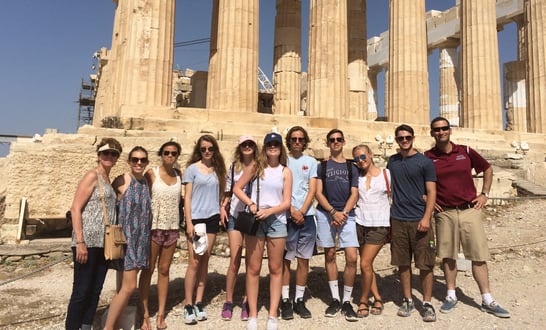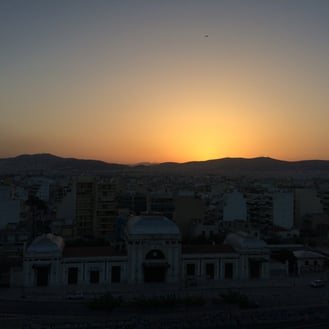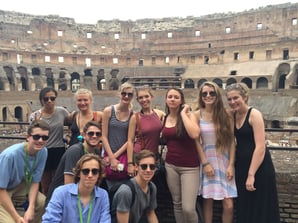
When it’s over 100 degrees Fahrenheit in Athens, you don’t usually complain, because, well, you are lucky enough to be in Athens. But when you have been up since 6:00 am, walking almost continuously since 8:00, and you’ve already climbed the Acropolis, seen the Parthenon, the Parthenon Museum, the Plaka district, Agora, Temple of Zeus, and much more, it can be tempting to complain just a little. I asked the gang if they had it in them to see just one more thing, the National Archeological Museum, and the kids jumped at the chance.
The museum holds The Mask of Agamemnon, the Poseidon of Cape Artemision, Aphrodite of Cnidus--the list goes on and on. It is truly one of the greatest archaeological museums in the world. What impressed me so much was that the kids were willing and eager to walk farther, stand longer and endure the heat to finally see in person the things that we have studied in Latin class, Greek, English or History class.
 Tabor students visited Italy and Greece this summer just after the close of school. The group was made up of eleven students, and two faculty. We started in Florence and traveled south through Rome, Naples, Sorrento, Bari, Delphi and finally Athens before returning home. Along the way we saw the Vatican, the Colosseum, Pompeii, Capri, just to name the most notable spots. But sightseeing wasn't really the goal of the trip; the goal was to see our studies come alive in a way that wasn't really going to be possible in the classroom.
Tabor students visited Italy and Greece this summer just after the close of school. The group was made up of eleven students, and two faculty. We started in Florence and traveled south through Rome, Naples, Sorrento, Bari, Delphi and finally Athens before returning home. Along the way we saw the Vatican, the Colosseum, Pompeii, Capri, just to name the most notable spots. But sightseeing wasn't really the goal of the trip; the goal was to see our studies come alive in a way that wasn't really going to be possible in the classroom.
Tabor’s Latin text, called the Oxford Latin Course, focuses on the specific time between about 50 BCE and 80 CE when our hero Quintus travels throughout the ancient world. We find that this Quintus is the famous Quintus Horatius Flaccus or Horace, best known for penning the phrase Carpe Diem, and writing extensively about the philosophical ideals  behind that simple phrase. More than reading about the Horatian world view, we lived it. We worked hard, lived simply, enjoyed each moment as it came: we truly did ‘seize the day’ as best we could.
behind that simple phrase. More than reading about the Horatian world view, we lived it. We worked hard, lived simply, enjoyed each moment as it came: we truly did ‘seize the day’ as best we could.
Those of us with pedometers logged seven, eight, even nine miles walking on some days, mostly on marble floors or basalt roadways - I think Horace would be proud, after all, he walked them himself.








